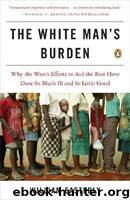The White Man's Burden by William Easterly

Author:William Easterly
Language: eng
Format: mobi, epub
Tags: non.fiction, philosophy
ISBN: 9780143038825
Publisher: Penguin Books
Published: 1992-01-01T00:00:00+00:00
IMF Riots
Quito is a favorite destination of IMF staff, who gave Ecuador sixteen standby loans over 1960–2000. In the year 2000, the latest IMF loan’s austerity measures induced reductions in teacher salaries and increases in fuel and electricity prices.
On January 22, 2000, three thousand protesters from Ecuador’s indigenous groups occupied Congress, while more than ten thousand demonstrated outside. The government of democratically elected president Jamil Mahaud confronted them with more than thirty-five thousand soldiers and police. The leaders of the armed forces saw the handwriting on the wall, however, and deposed Mahaud on January 23, 2000, in favor of his vice-president, Gustavo Noboa. Noboa insisted he would continue with the IMF reforms.
In May 2000, teachers in Ecuador went on strike for five weeks to protest salary reductions. The government dispersed a demonstration of teachers in the capital with tear gas and riot police. On June 15, 2000, protest groups organized a general strike, which included teachers (again), government employees, doctors, oil workers, and unions. There was another tear gas confrontation between riot police and protesters in Quito. The army sent a unit under Colonel Lucio Gutiérrez to break up the protests. Colonel Gutiérrez instead sided with the indigenous protesters and attempted an unsuccessful coup. The army put down the coup and fired Gutiérrez.
Noboa temporarily managed to survive the protests, and the country wound up complying with the IMF conditions. The protesters got revenge at the next election, in November 2002, when the voters elected as president former coup leader and populist hero Lucio Gutiérrez.
By February 2004, the indigenous groups began protesting against Lucio Gutiérrez for once again cozying up to the IMF. On April 20, 2005, Gutiérrez, like his many predecessors, fled the presidential palace for good.9
Ecuador was not alone in protesting against the IMF. In the first nine months of 2000 alone, there were demonstrations against IMF programs in Argentina, Bolivia, Brazil, Colombia, Costa Rica, Honduras, Kenya, Malawi, Nigeria, and Zambia.10 We cannot always conclude that the protesters are representative of the majority, but at the very least, it is a sign of the impact of the IMF on domestic politics.
We still haven’t exhausted the roll call of IMF involvement in domestic politics. There is an association between IMF involvement and the most extreme political event: total state collapse. Of course, prior to disappearing into the parallel universe of social collapse these governments were already very sick at the time they were getting IMF loans. It is unclear how much blame the IMF bears for subsequent collapse in these unfortunate countries, but financial indiscipline was the least of their problems. Liberia spent 77 percent of the period 1963–1985 in an IMF program, before finally collapsing into anarchy after 1985. Somalia spent 78 percent of the decade 1980–1989 in an IMF program, after which the warlords tore the country apart.
Table 4 shows that of all eight cases worldwide of state failure or collapse, seven of them had a high share of time under IMF programs in the ten years preceding their collapse.
Download
This site does not store any files on its server. We only index and link to content provided by other sites. Please contact the content providers to delete copyright contents if any and email us, we'll remove relevant links or contents immediately.
International Integration of the Brazilian Economy by Elias C. Grivoyannis(111057)
The Radium Girls by Kate Moore(12028)
Turbulence by E. J. Noyes(8047)
Nudge - Improving Decisions about Health, Wealth, and Happiness by Thaler Sunstein(7706)
The Black Swan by Nassim Nicholas Taleb(7129)
Rich Dad Poor Dad by Robert T. Kiyosaki(6632)
Pioneering Portfolio Management by David F. Swensen(6300)
Man-made Catastrophes and Risk Information Concealment by Dmitry Chernov & Didier Sornette(6019)
Zero to One by Peter Thiel(5801)
Secrecy World by Jake Bernstein(4753)
Millionaire: The Philanderer, Gambler, and Duelist Who Invented Modern Finance by Janet Gleeson(4478)
The Age of Surveillance Capitalism by Shoshana Zuboff(4292)
Skin in the Game by Nassim Nicholas Taleb(4248)
The Money Culture by Michael Lewis(4207)
Bullshit Jobs by David Graeber(4190)
Skin in the Game: Hidden Asymmetries in Daily Life by Nassim Nicholas Taleb(4006)
The Dhandho Investor by Mohnish Pabrai(3764)
The Wisdom of Finance by Mihir Desai(3746)
Blockchain Basics by Daniel Drescher(3582)
